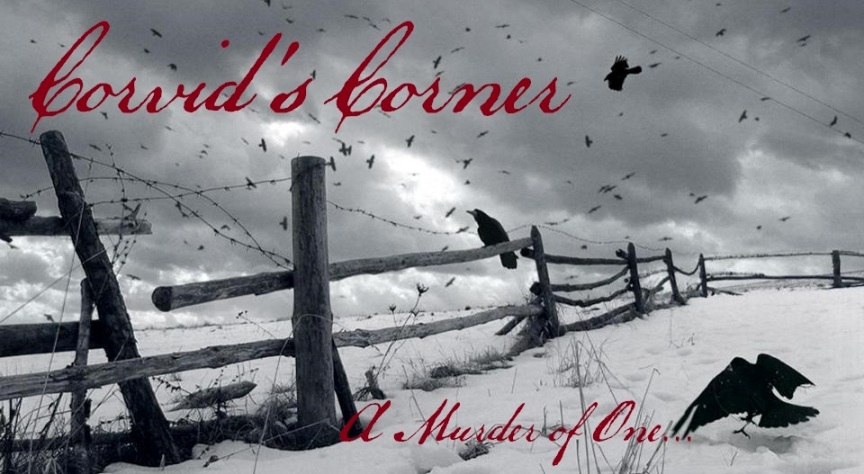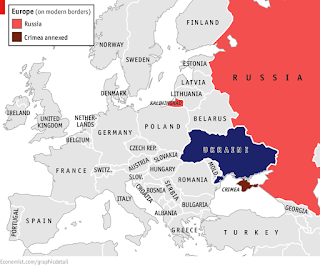 |
| Made me laugh... |
In my last post, I commented on how the situation in Syria had inflamed tensions between the US and Russia, and how Trump's election should calm things down a bit.
However, it should hopefully also help calm things down between Russia and NATO - and for that we shall look at the Ukraine.
As we can see, the former Soviet Republic is located right on Russia's south-western European border. Now, after the breakup of the Soviet Union, the various republics went their respective ways. Ukraine, which had long had a nationalist independence movement, was for the most part very happy to go off on its own.
However, as always, things were not quite so clear cut. You see, the eastern part of Ukraine has a population that is largely ethnically Russian, speaks Russian, and wishes to maintain ties with Moscow. The western part of the country speaks Ukrainian, and wants an independent Ukraine with close ties to the West and the EU. Roughly, the country breaks down in this wise (based on the census of 2001):
However, as always, things were not quite so clear cut. You see, the eastern part of Ukraine has a population that is largely ethnically Russian, speaks Russian, and wishes to maintain ties with Moscow. The western part of the country speaks Ukrainian, and wants an independent Ukraine with close ties to the West and the EU. Roughly, the country breaks down in this wise (based on the census of 2001):
 |
| See that red blobby bit on the bottom? That's the Crimea. |
Things kicked off in 2013 when the then president, Viktor Yanukovich, bucked the trend of previous governments throughout the 2000s and rejected closer ties to the European Union by refusing to sign an association agreement with the EU at the last minute, sparking peaceful protest. During these protests, Yanukovich signed a treaty with Russia instead, and took a multi-billion dollar loan from her. Things got rather warm at that point, and on 18th February 2014, violent clashes took place in Kiev, leaving 82 people dead. Long story short, by the 22nd February, the protesters were in control of Kiev and the parliament scheduled a new presidential election - Yanukovich having fled to Russia. American Senators and EU suits lined up to congratulate the protesters. Freedom and Democracy were alive and kicking, was the message.
Russia, having long dabbled in Ukrainian affairs, voted in the Duma to deploy troops to Ukraine on 1st March 2014. Within a day, Russian troops had complete control of the Crimean peninsula. Of course, the world and his wife lined up to brand Putin a madman, a tyrannical megalomaniac with imperial ambitions.
Of course, the Russophile east of the country was not quite so happy with the outcome of matters, and from March 2014 there was war in the Donbas region, with ethnic Russians opposing the new government - and supported by a number of Russian citizens.
So the Russians are the baddies, right? Well....yes, they are. But again, things are never quite so simple.
See, the Crimea had been part of Russia for a very great many years before the Soviet era. In point of fact, the Crimea was only transferred to the administration of Ukraine in the 1950s, as an administrative convenience. The Black Sea Fleet belonging to Russia was based there following the breakup of the USSR, although there was a bit of a tug-of-war going on over the fleet and the bases between Russia and Ukraine. So Russia understandably got a bit twitchy when things kicked off in Ukraine.
Consider also, that the removal of Yanukovich was in fact a coup d'etat - Petro Poroshenko, Yanukovich's successor has said as much and even asked the supreme court of the country to declare it a coup. Furthermore, the main movers behind the revolution was the far-right Svoboda party. What the west had supported was, in fact, the overthrow of a democratically elected government by a fascist putsch. Whoops. Not so squeaky clean, are we?
As a result of the annexation of the Crimea, sanctions have been imposed on Russia, which has had serious effects on the Russian economy. In response, Russia has banned western food imports, which has had the unfortunate (but predictable) effect of driving up food prices in Russia, hurting the man in the street as much as the sanctions do.
Now, both NATO and the EU have played their parts in this pantomime. NATO, doubtless with much prompting from the USA, has sought to strengthen itself by recruiting a number of former Soviet republics. The EU has also sought more members, expanding from 16 member states to 28 (and back to 27 soon enough, if the anti-democratic elements within our own parliament are kept at bay) since the Maastricht Treaty of 1992 turned the EEC into the EU. Both organisations have been fishing in what has long been Russia's pond, and Russia is none too happy about seeing its sphere of influence thus eroded. The USA would not tolerate it, but expects Russia to accept it without complaint.
Now, think on this: if the EU, through bungling managerialism and a lack of nous when it comes to realpolitik, had had an army to send out into the world, just how much of a mess would it have made of the Ukrainian crisis? Yet its own army is just what the EU is pushing for.
This brings us to the Baltic states, and Poland.
As a result of both the drives by NATO and the EU to recruit these states, and the ramping up of tensions with Russia over Syria, NATO troops, tanks and missiles have been massed on Russia's borders in the Baltic states and Poland, heightening tensions still further. With Trump in the White House, it is likely that we shall see much of this pressure lifted, which we can hope will result in tensions deflating.
So again, Trump's wish to improve relations with Russia mean that war with Russia is looking increasingly less likely than it did with the prospect of a Clinton administration.
So that's good.
Now, both NATO and the EU have played their parts in this pantomime. NATO, doubtless with much prompting from the USA, has sought to strengthen itself by recruiting a number of former Soviet republics. The EU has also sought more members, expanding from 16 member states to 28 (and back to 27 soon enough, if the anti-democratic elements within our own parliament are kept at bay) since the Maastricht Treaty of 1992 turned the EEC into the EU. Both organisations have been fishing in what has long been Russia's pond, and Russia is none too happy about seeing its sphere of influence thus eroded. The USA would not tolerate it, but expects Russia to accept it without complaint.
Now, think on this: if the EU, through bungling managerialism and a lack of nous when it comes to realpolitik, had had an army to send out into the world, just how much of a mess would it have made of the Ukrainian crisis? Yet its own army is just what the EU is pushing for.
This brings us to the Baltic states, and Poland.
As a result of both the drives by NATO and the EU to recruit these states, and the ramping up of tensions with Russia over Syria, NATO troops, tanks and missiles have been massed on Russia's borders in the Baltic states and Poland, heightening tensions still further. With Trump in the White House, it is likely that we shall see much of this pressure lifted, which we can hope will result in tensions deflating.
So again, Trump's wish to improve relations with Russia mean that war with Russia is looking increasingly less likely than it did with the prospect of a Clinton administration.
So that's good.


No comments:
Post a Comment